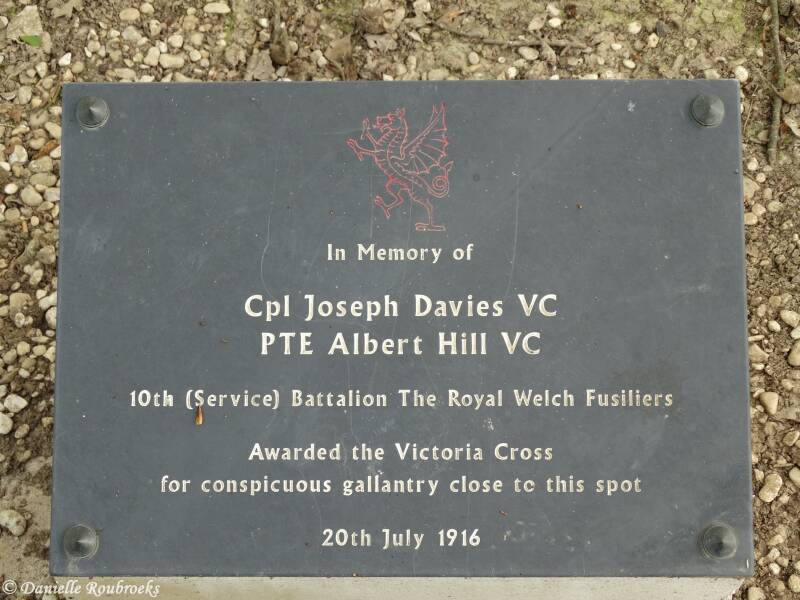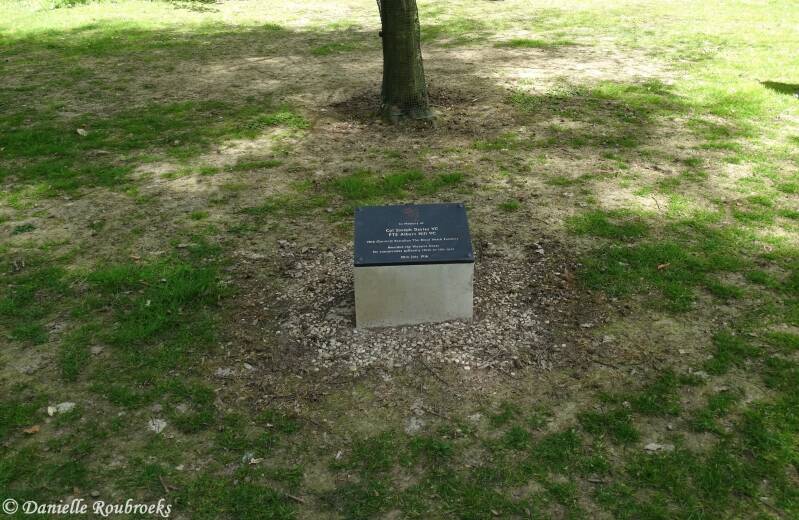South African (Delville Wood) National Memorial
Historical Information (Source: Wikipedia)
The Delville Wood South African National Memorial is a World War I memorial, located in Delville Wood, near the commune of Longueval, in the Somme department of France. It is opposite the Delville Wood Commonwealth War Graves Commission Cemetery, on the other side of the Longueval–Ginchy road.
The Memorial is a flint and stone screen, with a shelter at each end and in the middle an arch, surmounted by figures of a horse and two men (representing the two races of the Union) in bronze. It was unveiled by the widow of General Louis Botha on the 10th October 1926. It is fitting here to refer to the outstanding facts which this Memorial recalls: to the conquest of German South-West Africa in six months by South African troops; to the conquest of German East Africa by a South African Commander at the head of an Army mainly South African; and to the great record of the South African Brigade in France and Flanders. In Delville Wood the three Battalions employed in the capture and defence of the Wood were all but completely destroyed. At Arras and at Passchendaele, in April and September, 1917, they successfully overran the enemy defences.
From Gauche Wood and Marrieres Wood, in March, 1918, some 400 transport men and details came back, and the German tribute to the rearguard fighting of the 9th Division is well known. On Messines Ridge, in the following month, they stopped the enemy advance by counter-attacking and held the position until the reserves had come up. At Beaurevoir and Le Cateau, in October, 1918, they successfully dislodged the enemy from positions in which he was strongly posted; and on the 11th November, 1918 they were furthest East of all the British troops in France (ref Buchan: The South African Forces in France, page 256). During the Great War, the Union sent out on service 229,000 Officers and men. Of these, some 10,000 were killed in action or died of wounds or sickness; and their names are written in a book kept at the Delville Wood Memorial, on the site where their first great sacrifice was made. The memorial was designed by Sir Herbert Baker, assistant architect was Arthur James Scott Hutton, with sculpture by Alfred Turner.
VICTORIA CROSS
Corporal Joseph John Davies (28 April 1889 − 16 February 1976)
10th Bataillon, The Royal Welsh Fusiliers
Citation
For most conspicuous bravery. Prior to an attack on the enemy in a wood he became separated with eight men from the rest of his company. When the enemy delivered their second counter attack his party was completely surrounded, but he got them into a shell-hole, and, by throwing bombs and opening rapid fire, succeeded in routing them. Not content with this he followed them up in their retreat and bayonetted several of them. Corporal Davies set a magnificent example of pluck and determination. He has done other very gallant work, and was badly wounded in the second Battle of Ypres.
(Source: Wikipedia)
Citation
For most conspicuous bravery. On 20 July 1916, during the Somme Offensive, when 15280 Private Hill's battalion had been deployed under heavy fire, for an attack on the enemy in Delville Wood, France, the order to charge was given and he dashed forward. He met two of the enemy and bayoneted them both. Later, he was sent by his platoon sergeant, Hugh Green, to contact the enemy, and found himself cut off, being surrounded by over twenty Germans. He threw two hand grenades, killing and wounding about eighteen and scattering the remainder. He then joined a sergeant of his company and helped him to fight the way back to the lines. When he got back, hearing that his Company Officer, Captain Scales, and a scout were lying out wounded, he went out and assisted to bring in the mortally wounded Officer, two other men bringing in the scout. Finally, he himself captured two of the enemy and brought them in as prisoners. His conduct throughout was magnificent.
(Source: Wikipedia)


















































